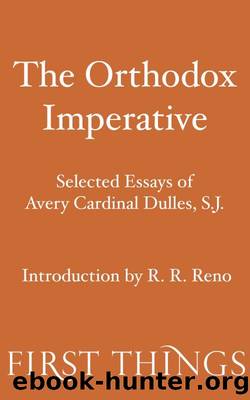The Orthodox Imperative: Selected Essays of Avery Cardinal Dulles, S.J. by Dulles Avery

Author:Dulles, Avery [Dulles, Avery]
Language: eng
Format: epub
Publisher: First Things Press
Published: 2012-07-15T00:00:00+00:00
John Paul II and the Truth about Freedom
(August/September 1995)
The rootedness of freedom in the truth has been a constant and central theme in the writings of John Paul II. Already in 1964, as a young bishop at Vatican II, Karol Wojtyla criticized the draft of the declaration on religious freedom because it did not sufficiently emphasize the connection between freedom and truth. âFor freedom on the one hand is for the sake of truth and on the other hand it cannot be perfected except by means of truth. Hence the words of our Lord, which speak so clearly to everyone: âThe truth will make you freeâ (John 8:32). There is no freedom without truth.â
Again in his first encyclical Redemptor Hominis (1979) John Paul II quoted the words of Christ, âYou will know the truth, and the truth will make you free.â He added: âThese words contain both a fundamental requirement and a warning: the requirement of an honest relationship with regard to truth as a condition for authentic freedom, and the warning to avoid every kind of illusory freedom, every superficial unilateral freedom, every freedom that fails to enter into the whole truth about man and the world.â
In his 1993 encyclical, Veritatis Splendor, the Pope rejects a series of ethical systems that propose novel criteria for the moral evaluation of human action. Despite their variety, he declares, these systems are at one in minimizing or even denying the dependence of freedom upon truth. This dependence, he says, finds its clearest and most authoritative expression in the words of Christ, âYou will know the truth, and the truth will make you free.â In Evangelium Vitae (1995) the Pope reaffirms the unbreakable link between freedom and truth.
The Popeâs philosophy of freedom runs counter to the value-free concept so prevalent in contemporary culture, perhaps especially in the United States. Many people today would say that freedom and truth are wholly separable, since anyone is free to affirm the truth and abide by it, to ignore the truth, or even to deny it and act against it. If freedom were bound by the truth, they ask, how could it be freedom? In the course of his discussion of freedom and law in Veritatis Splendor, the Pope proposes his answer to questions such as these.
I
Before undertaking to answer these difficulties, we would do well, I believe, to take a close look at the meaning of the term âfreedom,â which has different implications at the natural and the personal levels.
At the lower level, that of nature, freedom means the absence of physical constraint. A balloon rises freely when nothing obstructs it; a stone falls freely when nothing impedes it. A dog is free if it is let off the leash so that it can follow its impulses. To be free, in this sense, is to act according to an inner inclination. To be unfree is to have that inclination frustrated.
At the higher level, distinctive to persons, freedom demands, in addition, the absence of psychological compulsion. My
Download
This site does not store any files on its server. We only index and link to content provided by other sites. Please contact the content providers to delete copyright contents if any and email us, we'll remove relevant links or contents immediately.
Christian Ethics by Wilkens Steve;(854)
Christian Ethics for a Digital Society by Kate Ott(778)
Fearfully and Wonderfully Made by Philip Yancey & Paul Brand(769)
God and the Multiverse by Victor J. Stenger(672)
Numbers by Ronald B. Allen(632)
How to Read Slowly by James W. Sire(613)
Christian Ethics: An Introduction to Biblical Moral Reasoning by Wayne Grudem(597)
The City of God by Saint Augustine & Marcus Dods(577)
Monastic Archaeology by Unknown(564)
Morality by Jonathan Sacks(564)
The Technological System by Jacques Ellul(543)
Amish Grace by Donald B. Kraybill & Nolt Steven M. & Weaver-Zercher David L(531)
Death of the Doctor by Unknown(525)
The Disabled Church by Rebecca F. Spurrier;(521)
Jesus: A New Vision by Whitley Strieber(518)
Children of Lucifer; The Origins of Modern Religious Satanism by Ruben van Luijk(505)
Critical Writings by Joyce James;(499)
Redeeming Sociology by Vern S. Poythress(485)
The Church in the Early Middle Ages by G.R. Evans(475)
